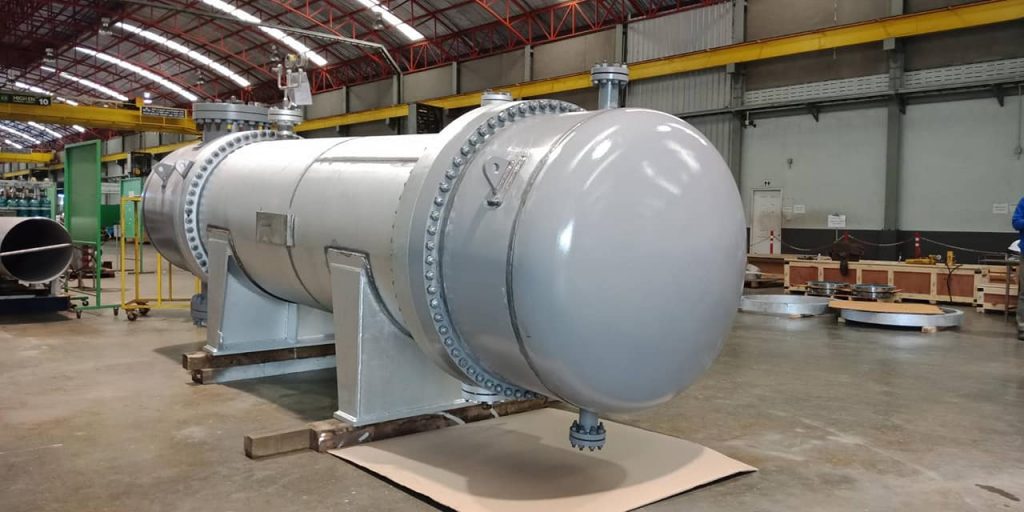Suitable Materials for Shell and Tube Heat Exchangers in the Food Industry
The food industry requires materials that are:
Corrosion-resistant (to withstand cleaning chemicals like CIP solutions).
Non-toxic & FDA-compliant (no leaching of harmful substances).
Smooth & non-porous (to prevent bacterial growth, easy to clean).
Durable (resistant to wear, thermal cycling, and frequent sterilization).
1. Preferred Tube Materials
A. Stainless Steel (Most Common)
- SS 304 (AISI 304)
- General-purpose, cost-effective.
- Resists mild acids, chlorides, and organic food products.
- SS 316/316L (AISI 316L – Low Carbon Preferred)
- Better corrosion resistance (Mo content helps against chlorides & acids).
- Used for dairy, juices, beer, brine solutions.
- Electropolished SS 316L
Ultra-smooth surface (reduces biofilm formation
- Used in pharma, high-purity food processing.
B. Titanium (For Highly Corrosive Media)
- Grade 2 or Grade 7 (Pd-alloyed for HCl resistance)
- Excellent for saltwater, acidic fruit juices (citric acid), vinegar.
- Used in seafood processing, pickling plants.
C. Copper Alloys (Limited Use – Mostly Historical)
- Cupronickel (90/10 or 70/30 Cu-Ni)
- Good for pasteurizers, brewing.
- Disadvantage: Not ideal for acidic foods (can leach ions).
D. Nickel Alloys (Special Cases)
- Hastelloy C-276 / Inconel 625
- Used for extremely corrosive foods (e.g., high-acid juices, sulphite solutions).
2. Shell Material
- SS 304 or SS 316 (same as tubes for consistency).
- Carbon Steel with Stainless Steel Cladding (for cost savings in large exchangers).
3. Gaskets & Seals
- FDA-Approved EPDM (Ethylene Propylene Diene Monomer) – For hot water/steam.
- PTFE (Teflon) – Chemical resistance, used with aggressive CIP cleaners.
- Silicone – High-temperature flexibility.
4. Surface Finish Requirements
- Ra (Roughness Average) ≤ 0.8 µm (smooth finish for cleanability).
- Electropolishing (for ultra-hygienic applications like baby food, dairy).
5. Design Considerations for Food Industry
Sanitary Design:
- No dead zones (fully drainable).
- Easy disassembly for cleaning (removable tube bundles).
CIP (Clean-in-Place) Compatibility: - Must withstand caustic (NaOH), acidic (HNO₃), and sanitizing (peracetic acid) solutions.
Avoid Lead & Cadmium:
- No brass/bronze in direct contact with food (unless de-leaded).
Material Selection Table for Food Applications
| Application | Recommended Material | Reason |
| Dairy (Milk, Yogurt) | SS 316L (Electropolished) | Resists lactic acid, easy cleaning |
| Fruit Juices (Orange, Apple) | SS 316L or Titanium | Citric acid resistance |
| Beer & Brewing | SS 316L / Cupronickel (limited) | Prevents metallic taste |
| Seafood Processing | Titanium | Resists saltwater corrosion |
| Sugar & Syrups | SS 304 | Cost-effective, non-reactive |
| High-Acid Foods (Vinegar, Pickles) | Titanium / Hastelloy | Extreme corrosion resistance |
Key Standards for Food-Grade Heat Exchangers
- FDA 21 CFR (U.S. Food and Drug Administration compliance).
- EHEDG (European Hygienic Engineering & Design Group) guidelines.
- 3-A Sanitary Standards (for dairy and beverages).
- ASME BPE (Bioprocessing Equipment) for high-purity applications.
Conclusion
- SS 316L is the most widely used (best balance of cost, corrosion resistance, and cleanability).
- Titanium is preferred for highly acidic or salty foods.
- Avoid carbon steel & copper unless properly lined/clad.
